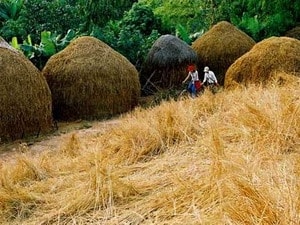Turn straw into fertilizer, saving thousands of billions of dong
Research and application of scientific and biotechnological advances in the treatment of agricultural waste is considered the right direction, ensuring sustainable agricultural production in the context of fields being at risk of pollution and "poisoning" due to people abusing chemical fertilizers for crops.
Research and application of scientific and biotechnological advances in the treatment of agricultural waste is considered the right direction, ensuring sustainable agricultural production in the context of fields being at risk of pollution and "poisoning" due to people abusing chemical fertilizers for crops.
Turn straw into organic fertilizer
According to statistics, in Vietnam, 70% of the population is engaged in agriculture and rice is the main crop, so the amount of straw after harvest is very large, estimated at nearly 46 million tons/year. The amount of excess straw is processed by farmers by burning it right in the fields, polluting the living environment and the field ecosystem, especially in rural areas.

Farmers will not have to spend money on chemical fertilizers when they have organic fertilizers created from the straw after harvest. (Source: khoahoc.com.vn)
Therefore, to contribute to reducing pollution, the research topic "Biochemical product (Fito-Biomix RR) to treat straw and the process of treating straw into organic fertilizer using this product" has been applied and the Department of Intellectual Property - Ministry of Science and Technology granted exclusive utility solution patent No. 956 to author Le Van Tri - General Director of Hanoi Biotechnology Joint Stock Company.
The project includes many successful research and testing projects in many different localities such as Thai Binh, Nam Dinh, Thanh Hoa, Hoa Binh, Hung Yen, Hanoi... bringing about clear economic efficiency, highly appreciated by agricultural experts and farmers.
The process of converting straw into organic fertilizer is carried out through the following steps: fresh straw after harvest is piled up with a width of 2m, every 30cm layer is watered with a layer of Fito-Biomix RR solution, adding NPK and manure if available.
Then, compost the straw by using nylon, canvas, torn sacks, and mud to cover tightly, ensuring the composting temperature is between 45-50 degrees Celsius. After 10 to 15 days, check and mix. This makes the straw more crushed due to mechanical impact, ensuring the humidity and temperature of the compost pile are always at optimal levels, creating conditions for the straw decomposition process to take place quickly and thoroughly.
During the composting process, if you find any areas that are not sufficiently moist, add more water to allow the material to decompose completely. After 25 to 30 days, the straw will decompose well into organic compost.
According to the author, the quality of straw after 30 days of incubation with Fito-Biomix RR product has decomposed well, turned brown, bacteria and molds have grown well, and the straw has decomposed about 80-85%.
The straw compost pile is supplemented with microorganisms and nutrients. After 30 days, the total carbon content decreases, the effective nitrogen and phosphorus content, and the density of microorganisms increase. After the composting process, organic fertilizer from straw can be used immediately for the next crop or stored for use in the next crop.
Detoxifier for fields
According to scientists, after each harvest, 1 hectare of rice will yield 6 tons of straw. If burned, it will cost more than 5.5 million VND, while the same amount of straw, if treated with biological products, will yield about 400 kg of organic fertilizer.
Master Le Van Tri, project manager, said that when applying this organic fertilizer to rice and corn, the amount of chemical fertilizer is reduced by 20-30%, crop yield increases by 10-15%, contributing to saving production costs and increasing economic value for farmers.
If all the country's post-harvest straw (about 45 million tons) is processed, it will produce 20 million tons of organic fertilizer, farmers will not have to spend money on chemical fertilizers (NPK) of 200,000 tons of nitrogen, 190,000 tons of phosphate and 460,000 tons of potassium, thus saving nearly 11,000 billion VND.
In addition to the economic benefits, using biological products such as Fito-Biomix RR to process straw into organic compost for plants will take advantage of the surplus product after harvest to supplement organic fertilizer on site, save costs and create a habit for people not to burn straw after harvest, protect the environment, increase soil fertility and improve crop productivity and quality.
In the process of developing sustainable agriculture, organic fertilizers are considered as a leading factor to help improve product quality as well as improve soil fertility. Moreover, the trend of small-scale farming in households is almost gone, so the demand for organic fertilizers from straw is very large.
Currently, the project team has proposed to develop a long-term plan to utilize the excess straw and stubble after harvest to produce organic fertilizers to return to the soil what the plants have taken away, improve the soil, increase the humus content in the soil, increase soil porosity, stabilize pH, make the soil better and better for rice cultivation, reduce pests and diseases, do not use toxic pesticides, and create safe rice products.
This work needs to be widely implemented in many localities across the country, combining forms of technology transfer research and extensive propaganda to change people's habits of using chemical fertilizers in farming, taking advantage of available raw materials to bring economic benefits and contribute to protecting the environment and field ecology./.
(According to VNA) - VT






